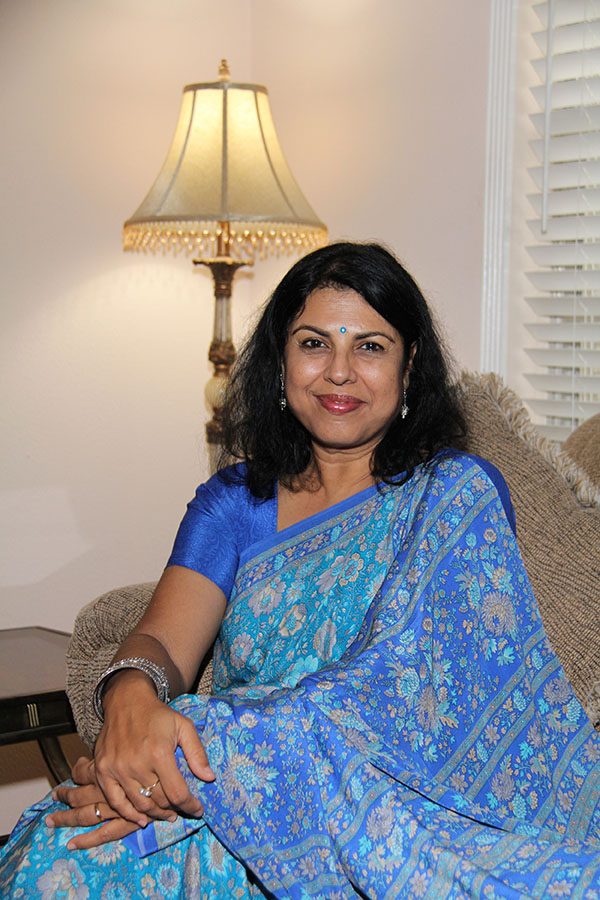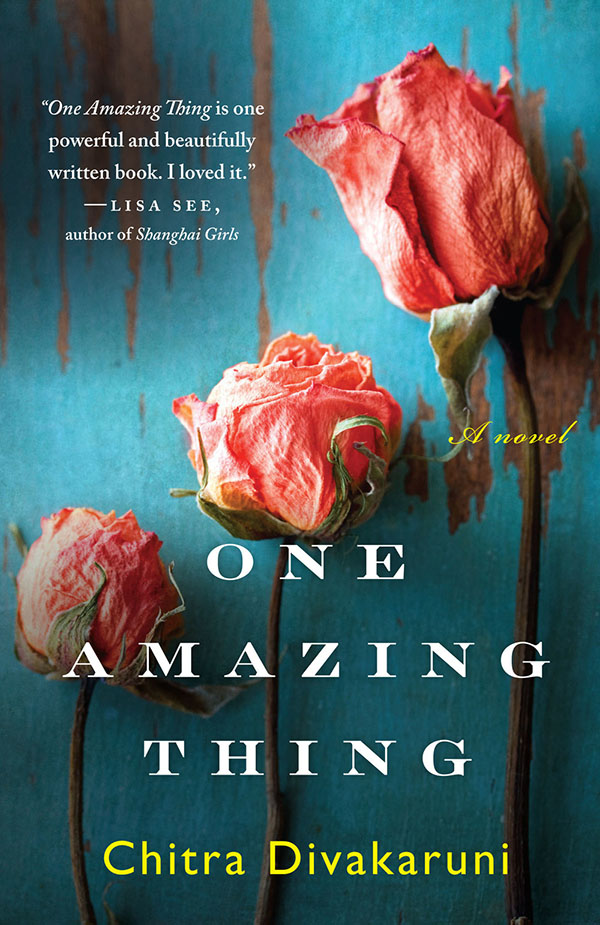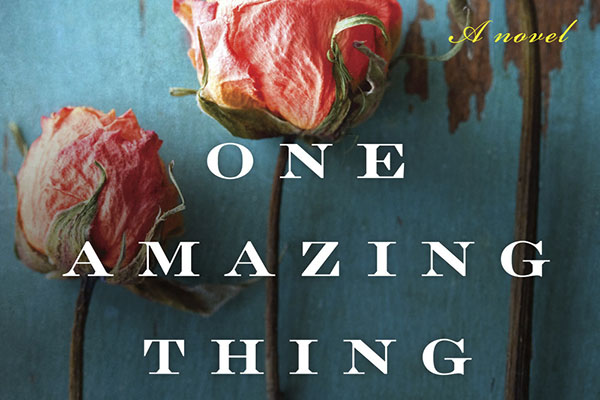Conversations with smart people about stuff that affects our world, and how we affect it
University Communication's Dave Blanks interviews Chitra Divakaruni about her book One Amazing Thing. The book was chosen for Appalachian's 2017-2018 Common Reading Program.
Transcript
From Appalachian State University in Boone, North Carolina, this is SoundAffect. Here’s your host Megan Hayes.
Megan Hayes: Our guest today, Chitra Banerjee Divakaruni’s is an award-winning and best-selling author, poet and professor of writing at the University of Houston. Her stories explore women, immigration, history, myth, magical realism, and diversity. She has been published in over 50 magazines, including The New Yorker, and her work is in over 50 anthologies, including The Best American Short Stories, the O. Henry Prize Stories and the Pushcart Prize Anthology. Her books have been translated into 29 languages. Many of them have been used for campus-wide and city-wide reads as was the case here at Appalachian State. Chitra’s most recent novel One Amazing Thing was chosen as this year’s common reading selection which means all incoming first year students read the book as a common experience before they become students here at Appalachian. At her home in Houston, she took time out of her day to chat via Skype with our Dave Blanks who hosts one of our most popular podcasts, Dave by the Bell. We’ll go now to the conversation as Chitra Divakaruni discusses storytelling, inspiration, and the transformational power of love. Our own Dave Blanks caught up with Chitra after her trip to Boone while she was at her house in Houston. The two discussed her book as well as covered the power of storytelling, Chitra's inspiration and the transformational power of love.
Dave Blanks: Chitra Banerjee Divakaruni is our guest today and Chitra, thank you so much for joining me.
Chitra Banerjee Divakaruni: My pleasure, absolutely!
Dave: Your story is one of nine strangers caught in a dangerous situation unsure of their fate. These strangers overcome terror and strife through the power of sharing their own personal stories. Your book is about the power of sharing stories. That’s a recurring theme, so can you point to a time, or times in your own life possibly when you have seen stories change in outcome?
Chitra Banerjee Divakaruni: Yes, definitely. When-- soon after hurricane Katrina devastated New Orleans, I was-- a lot of the people who had suffered from that hurricane came to houston to try and rehabilitate, and I was a volunteer with the city programs that were trying to help these people, and place these people, and I was doing intake. So, I would ask these people who came to the center, “Please tell me what happened and please tell me what you need so that we can best meet your needs.” and I noticed that there were some people who were unable to talk about the event and they were very upset and you know it was very hard to communicate with them or to help them. And -- there were others who when I asked them what happened they would launch into a story like you know, “That night, I was sleeping and then I heard this terrible rushing noise outside and I stepped out of bed into like a half a foot of water” and then they would tell me this whole story and as they told it, it was like you know they were able to get rid of some of that anxiety and pain and --- being able to share their story. And then it became much easier to help them because they could actually think through their lives and tell me what they needed most. So that was-- I saw how being able to tell a story really heals you of that experience to a great degree. And the other side of it was that as I listened to their stories, I could-- I could see how I could empathize a lot more with these characters, these people who were telling me the story. And then I could-- you know I would go the extra mile trying to figure out how to get them back on their feet. So right there I saw that when you are able to tell a story or to listen to a story, it creates a whole different level of connection.
Dave: Absolutely, yeah it probably gives people who are in that frantic state of mind when you're meeting them, something other than all this crazy stuff to focus on. Even just getting their brain working in that way of, “Okay, this happened and then this happened and then this happened”, can-- I’m sure calmed them down. Just from their perspective it’s probably good for them for that.
Chitra Banerjee Divakaruni: Right!
Dave: Yeah, and then for you, who obviously have a heart for people to begin with, to hear their story, I’m sure that was pretty powerful for you as well.
Chitra Banerjee Divakaruni: Yeah I think the story brings the experience alive for both the teller and the listener. And for the teller it’s very empowering because, the teller is-- what the teller is saying is “Look, it was a terrible experience but I came through it. I survived.” and they realize that as they’re telling that story. And for the listener of course you know you empathize, you can really feel the pain of the person or the joy of the person depending on the story. The triumph of that person, the courage of that person, all of those things come out through stories. Even stories that are, you know, sad or tragic ones.
Dave: Do any of those stories stay with you? The ones that you heard.
Chitra Banerjee Divakaruni: Well, sometimes stories do stay with me so this a story that someone told me which is-- which relates to the book. And this was when I had gone to do a city wide read for the book up in the midwest, and this old lady, I mean she was really old, she must’ve been in her nineties. She came to me and she said, “I wanna tell you something” she said “I was a survivor of the nazi concentration camps. I was just a little girl when all of that happened and I was rescued. Now a number of my family members died and I always felt so ashamed and guilty and I just felt so negative about that, that when I was able to come to America I just shut out that part of my life. I never told anyone about it, but after I read your book I felt it was an important story that people in my family needed to know. And so I started telling that to my grandson. And as a result my grandson and I have such a connection now. I mean he really understands and he really-- he really is very respectful of all of that i've gone through and he just appreciates that so much and I appreciate him for you know appreciating me and listening to me and it's just changed my life.”, and that was so touching for me. That was an example of -- how a story can really transform you, especially a story if you've held onto to it for so long.
Dave: That’s amazing.
Chitra Banerjee Divakaruni: Yeah, yeah I felt it and it was quite amazing.
Dave: Yeah, really! So, -- this is -- so how did you choose the characters for -- for-- so how did you choose the characters for One Amazing Thing?
Chitra: Well you know when I write most of the time I have to wait as I’m writing for the characters to come to me. So the only person I really knew in One Amazing Thing when I started writing it was Uma, the first character in whose consciousness we are when we enter the visa office. I didn't know exactly who she would meet in the visa office. I knew there would be a group of people, I knew there was going to be a disaster, in this case an earthquake, but I didn't know anything else about them. So I had to write that first scene and allow these characters to come to me. Now I knew they were going to be from many different backgrounds because that's kind of the premise of the story, which is of One Amazing Thing, which is telling stories allows us to connect across diverse, you know diverse backgrounds, diverse religions, all kinds of things that we otherwise think of as barriers. The story helps us overcome that barrier. So I knew they would be diverse, but that’s all I knew about them.
Dave: And then they just come to you huh?
Chitra: Yes, so here is Uma she is now in the visa office in the basement of this building and she’s looking around to see who else is there. And as she looks around, these characters start coming to me.
Dave: Were there times when you were developing the characters in the story or -- when you thought possibly you were concerned about perpetuating stereotypes, is that something that you were sensitive to or were considering when you were-- when you were developing these characters?
Chitra Banerjee Divakaruni: Definitely, because one of my projects or one of my goals you can say as a writer, is to try and break down stereotypes as much as possible. Because I think, you know, stereotyped thinking or stereotyped attitudes towards people, that's the first step towards prejudice. And then you know after that there's racism, there's violence. It all stems from prejudice, which goes back to this kind of thinking and I wanted to break through stereotypes. And so I hope that i’ve managed to create characters, who although they are very much of their background, both culturally and maybe religion wise, race wise, or even financially they belong to a certain strata, I hope that as their stories are told that the readers prejudices, if there are any, will begin to dissolve. And the reader will see each character as one human being, you know, one special amazing human being, with their problems, with their faults, that's human, we all have that. But, I surely hope that that’s what the reader will begin to see and seeing that in the book then we begin to notice it in our lives as well. That “Oh this person about which whom I held all these preconceived notions, these stereotypes. Well really that persons not like that. There’s a greater depth to that person than what I thought before.”.
Dave: Each of the stories your characters in the book share are about the transformational power of love in one or another. And I wonder after reading it whether the act of story sharing reduces or simplifies us in a way to that greatest common denominator, and once we've exposed that, then we can find commonalities?
Chitra Banerjee Divakaruni: I think you are very right because-- and with each of these people in One Amazing Thing, they weren't just sharing a random story, they were sharing like a story that was really meaningful to their lives. The story of something that made them who they are today. And so you know when we talk to people, and we communicate with people, when we tell them something through story about something deep in us, we’re really opening ourselves and making ourselves vulnerable and out of that vulnerability, if it is reciprocated, I think a strong loving bond begins to grow. And so there is a particular kind of loving and caring that begins to grow among these people who are, you know, who are trapped in the visa office and this huge earthquake has hit and now you know the electricity is off, waters rising, there's not enough food, there's not enough drinking water, but these people come together. In the beginning of this story their each one for themselves. They just want to survive, they don't care what happens to the others. But through the sharing of stories, they become real to each other. They're like real people, and then they begin to care about each other. So, on one level that is how love is working, and then on another level each of the stories-- you're very right-- each of the stories is about love. How the presence of love can redeem us and the absence of love can really doom us.
Dave: So, we’re a college campus. We’re Appalachian State University, as you know because you spoke here and your book is the required reading. So, how do you feel we can go about fostering this kind of bringing people together through sharing stories? How can you bring out people’s stories on our campus or just in our lives or our listeners lives?
Chitra Banerjee Divakaruni: Well, I think the first thing is what you guys are already doing, which is having a common text, around which conversations have already begun and grown. Because, one of the problems in our everyday existence, in today’s world, is that we don't have many common experiences. You know, we’re each living our own lives, we’re very individualistic, which is not a bad thing. But, sometimes that really isolates us, and especially with now the internet taking up so much of the young people’s time, there's not as much personal contact with each other. So I know that one of the assignments that was gonna come out of this common text was, an encouragement for people to be able to write down their stories, and share it with each other. Either in a classroom environment or some other you know group environment, and that will create two wonderful things I’m hoping. One is that the person who tells his or her story is able to open up and there will be a proper forum where that person isn't afraid to open up, because he or she knows that her story will be taken seriously and respectfully. And the other thing that will happen is that the other people in the group, hearing that story, will begin to connect to it, and will begin to get to know the other person, the writer of the story, at a much deeper level. And this will begin to create a strong community or really a stronger community than there was before stories were shared. There's a lot of trust that comes along with offering your story or listening to it and offering another story back in that same forum. I think that could really bring people together and also I’m hoping that you know this will be something that they remember, “Oh remember we read that book? Remember we told our stories?” and I think that will be you know something to carry with them. And I’m sure for many of our students, these stories are stories that they've never told anyone, and they've maybe never had a forum to tell them. And one of the things I think when -- that freshman often feel when they come to a new campus is that they feel so alone. For some of them, they’ve left a very different kind of home environment and they are feeling alone, for some of them maybe they're the first person who in their family who's coming to a university and you know that can be pretty scary. And I think if there's a place where, through their story, their background is validated and people are saying “Wow! That’s amazing! That’s wonderful! I really enjoyed hearing that”, that would give them so much confidence to go on in college and be successful, be comfortable, and also this would positively impact, this added confidence would positively impact the rest of their studies.
Dave: Chitra, thank you so much for your time. I really appreciate you taking this time to talk to us. So thank you, thank you very much.
Chitra Banerjee Divakaruni: It’s absolutely my pleasure! I remember my visit to App State with great fondness. So I’m--
Dave: Well you'll have to come back! You should come back and visit!
Chitra Banerjee Divakaruni: Well not only was it a wonderful event and I loved meeting all the students and faculty and staff but that was the day of the eclipse! So I am never going to forget that!
Dave: Oh! Wow! What a momentous occasion!
Chitra Banerjee Divakaruni: So we all went outside and we shared in the eclipse and that makes a great story right there!
Dave: That’s perfect! That's a perfect story! Well Chitra thank you so much, I really appreciate it.
Chitra Banerjee Divakaruni: You're very welcome dave! Bye bye.
Megan Hayes: Chitra Divakaruni’s work can be found wherever books are sold and her website is chitradivakaruni.com
What do you think?
Share your feedback on this story.
Conversations with smart people about stuff that affects our world, and how we affect it
About the Common Reading Program at Appalachian
Since 1997, incoming first-year students at Appalachian State University have been asked to read a book as part of their orientation to the university. By participating in the Common Reading Program, students establish a common experience with other new students that will help develop a sense of community with their new environment and introduce them to a part of the academic life they are beginning at Appalachian. This program is an exciting facet in Appalachian's orientation of new students to life on campus. Learn more at https://commonreading.appstate.edu/about.
About Appalachian State University
As a premier public institution, Appalachian State University prepares students to lead purposeful lives. App State is one of 17 campuses in the University of North Carolina System, with a national reputation for innovative teaching and opening access to a high-quality, cost-effective education. The university enrolls more than 21,000 students, has a low student-to-faculty ratio and offers more than 150 undergraduate and 80 graduate majors at its Boone and Hickory campuses and through App State Online. Learn more at https://www.appstate.edu.





![The Search for Vertical Grasslands [alumni featured]](/_images/_posts/2026/03/vertical-grasslands-600x400.jpg)




![How NCInnovation Is Rethinking Economic Development in North Carolina [faculty featured]](/_images/_posts/2026/02/rethinking-economic-development-600x400.jpg)





